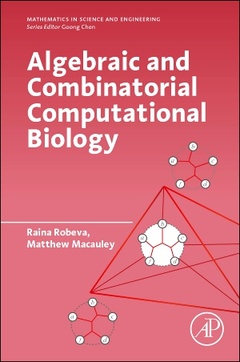Algebraic and Combinatorial Computational Biology Mathematics in Science and Engineering Series
Coordonnateurs : Robeva Raina, Macauley Matthew

Algebraic and Combinatorial Computational Biology introduces students and researchers to a panorama of powerful and current methods for mathematical problem-solving in modern computational biology. Presented in a modular format, each topic introduces the biological foundations of the field, covers specialized mathematical theory, and concludes by highlighting connections with ongoing research, particularly open questions. The work addresses problems from gene regulation, neuroscience, phylogenetics, molecular networks, assembly and folding of biomolecular structures, and the use of clustering methods in biology. A number of these chapters are surveys of new topics that have not been previously compiled into one unified source. These topics were selected because they highlight the use of technique from algebra and combinatorics that are becoming mainstream in the life sciences.
1. Multi-scale graph-theoretic modeling of bimolecular structures 2. DNA nanostructures: Mathematical design and problem encoding 3. Graphs associated with DNA rearrangements and their polynomials 4. Regulation of gene expression by operons: Boolean, logical, and local models 5. Modeling the stochastic nature of gene regulation: probabilistic Boolean networks 6. Inferring interactions in molecular networks via primary decompositions of monomial ideals 7. Analysis of combinatorial neural codes: an algebraic approach 8. Predicting neural network dynamics: insights from graph theory 9. Multistationarity in biochemical networks: Results, analysis, and examples 10. Optimization problems in phylogenetics: Polytopes, programming and interpretation 11. Clustering via self-organizing maps on biology and medicine 12. Toward revealing protein function: Identifying biologically relevant clusters with graph spectral methods
Upper division undergraduate and graduate students. Early career researchers in biology or mathematics, particularly those transitioning into the field of mathematical and computational biology. Some practitioners seeking a methods-based primer for the field.
Matthew Macauley is an Associate Professor at Clemson University in South Carolina. Since finishing his PhD in Mathematics from the University of California, Santa Barbara, he has been a research visitor at the Biocomplexity Institute of Virginia Tech, the Institute for Systems Biology in Seattle, and the University of Southern Denmark. He has also taught internationally in both South Africa and Taiwan. Macauley has supervised two PhD and five MS students, as well as a number of undergraduate research students. With Raina Robeva, he has co-organized three faculty development workshops on teaching discrete and algebraic methods in mathematical biology to undergraduates.
- Integrates a comprehensive selection of tools from computational biology into educational or research programs
- Emphasizes practical problem-solving through multiple exercises, projects and spinoff computational simulations
- Contains scalable material for use in undergraduate and graduate-level classes and research projects
- Introduces the reader to freely-available professional software
- Supported by illustrative datasets and adaptable computer code
Date de parution : 09-2018
Ouvrage de 434 p.
15x22.8 cm
Thème d’Algebraic and Combinatorial Computational Biology :
Mots-clés :
<; P>; Finite mathematics; Discrete Mathematics; Linear algebra; Abstract/Modern algebra; Graph theory; Mathematical Modelling; Operations Research; Linear Programming; Genetics; Cell and molecular biology; Biochemistry; Ecology; Evolution; Neuroscience; Systems biology; Bioinformatics<; /P>


